Customer relationship management (CRM) has evolved from a simple contact management tool to a much broader scope. While it’s still the core function of CRM software, sales pipeline management, automation, and data analytics are now equally important.
The future of CRM is even more dynamic. With AI and other innovative technologies, CRMs will continue to evolve and solve a variety of purposes, beyond customer data management.
That’s why it’s important to keep track of the latest CRM trends so you can be an early adopter of any new advancements in the field.
Luckily for you, we’ve covered the 13 biggest CRM trends to watch out for in 2025 in this post. Read on to find out what these are.
You May Also Like:
13 CRM Trends to Know and Use in 2025
Keeping up with the latest CRM trends can give you an edge over your competitors. By being an early adopter of these CRM trends, you can reap more benefits from CRM and deliver better customer experiences.
Read on to find some of the most important CRM trends that will dominate the industry in 2025 and beyond. Implement these to further optimize your CRM and get much better results.
1. Increasing Adoption of AI in CRM
Artificial intelligence is one of the most innovative technologies currently being adopted across various industries and CRM is no exception.
And why wouldn’t that be the case when AI can help you analyze client data better, aid customer service efforts, and improve overall sales processes?
According to The CRM Impact report by SugarCRM, 86% of surveyed sales and marketing professionals said they use AI to improve business processes.
Here are some of the most impactful use cases of AI in CRM:
- Predictive analytics to forecast sales, predict customer churn, etc.
- Intelligent lead scoring and more effective lead nurturing
- Use of conversational AI to automate customer interactions
- Personalized recommendations for cross-selling and upselling
- Automated emails triggered by specific consumer actions
One of the biggest CRM trends of the last decade has been the increasing adoption of AI in CRM because of its huge impact. With AI-powered CRM tools, customer relationship management is going to become more efficient and effective.
2. More Focus on Usability and Ease of Implementation
According to the previously cited SugarCRM report, 76% of marketers are frustrated with complicated, non-intuitive CRM systems.
In fact, it is one of the biggest CRM challenges facing marketing teams, business owners, and sales teams. As a result, it can lead to low end-user adoption and failed CRM implementation plans.
However, that’s changing—slowly but steadily.
In fact, one of the recent CRM trends is the increased focus on improving the usability and user experience of CRM software.
The emergence of companies like Less Annoying CRM is proof of that. It’s a company that emphasizes that its unique selling point is its ease of use. They’ve explained it well in the image below.
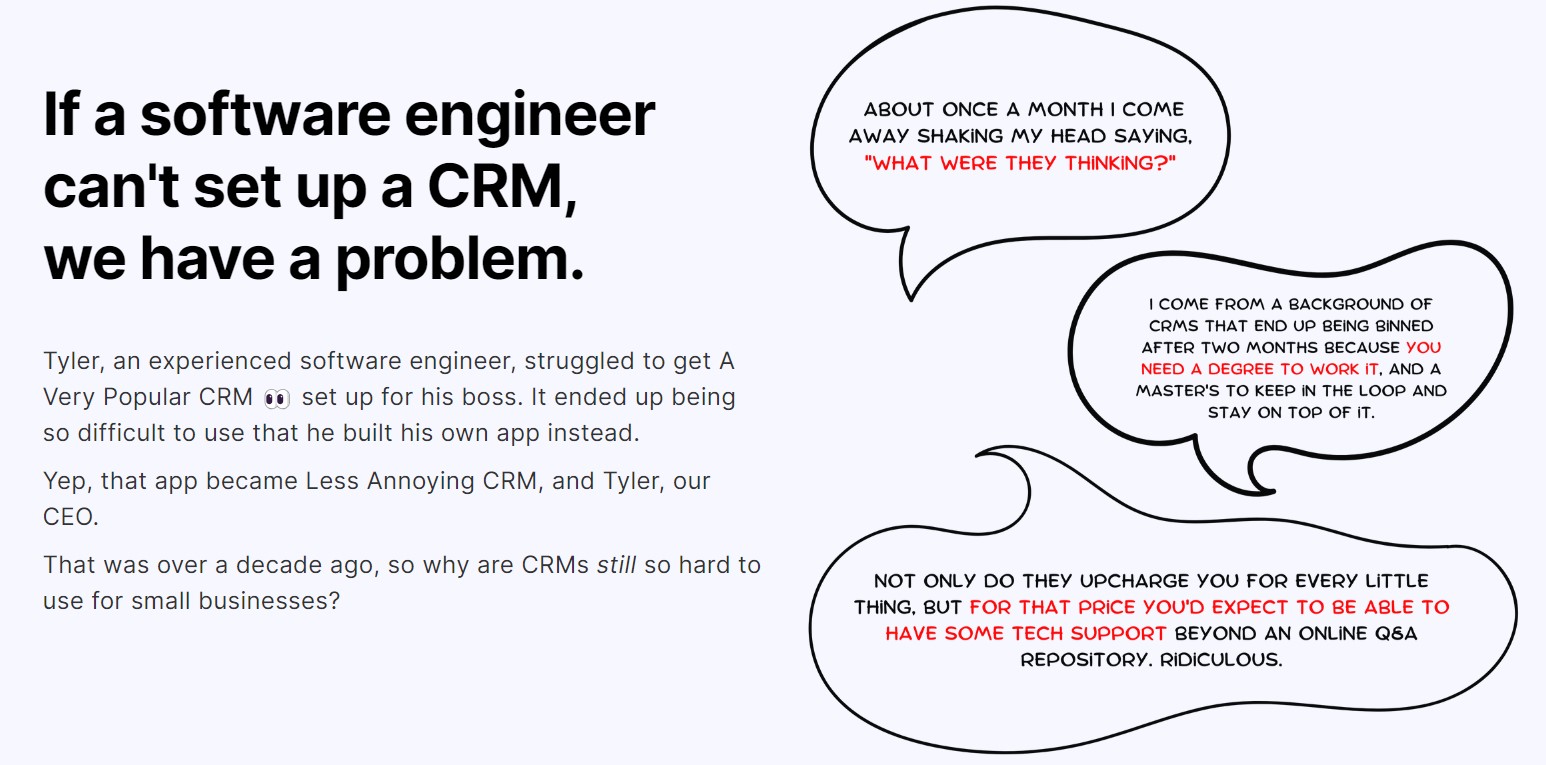
Image via Less Annoying CRM
The fact that top CRM software providers like Zoho are also coming up with simpler, beginner-friendly tools (Bigin by Zoho CRM) further strengthens this trend.
In the future, you can expect more vendors to offer simpler, more user-friendly CRM software to deal with the CRM implementation challenges. The barriers to user adoption will be lower than ever with this rising trend and it’ll be easier for small businesses to use CRM.
3. Integration of Voice and Conversational UI with CRM
Another one of the biggest CRM trends is the increasing use of conversational AI in CRM. Text-based chatbots won’t cut it anymore. More and more CRM software system vendors are incorporating voice-based conversational AI assistants into their CRM.
The future where voice-based assistants have human-like conversations with customers is not far.
With the use of Natural Language Processing (NLP) and machine learning, these conversations will become more nuanced with time.
This CRM trend can aid customer service efforts and help address customer inquiries more efficiently. In fact, there are CRM software solutions that are coming up with a conversational UI for their users as well.
You can use voice-based commands and the conversational assistant will help you fetch accurate data from your CRM.
The voice-assistant Zia by Zoho CRM is the perfect example of conversational AI’s integration with CRM.
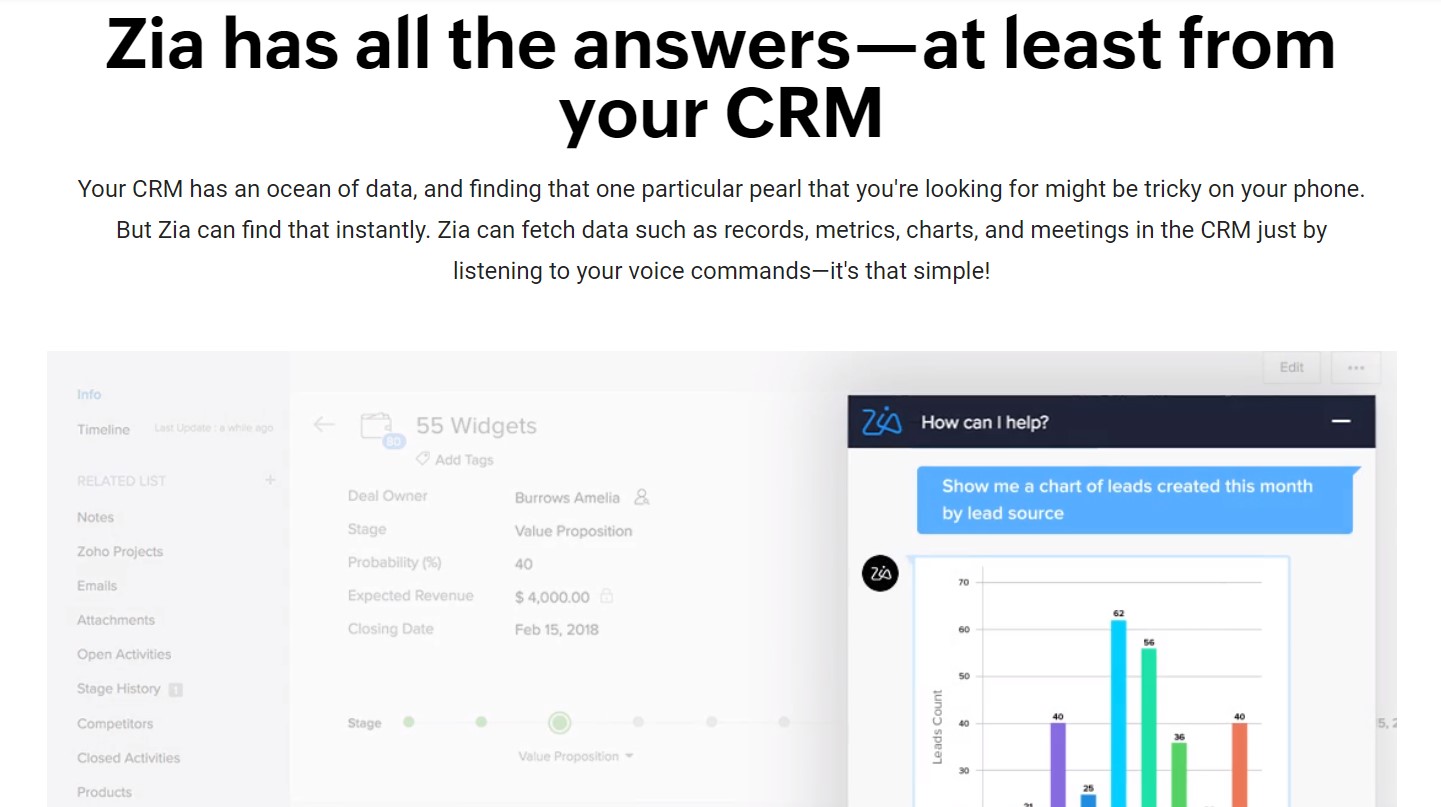
Image via Zoho CRM
4. Rising IoT Integration with CRM Systems
One of the more steady, but still important, CRM trends on this list is the integration of IoT with CRM software. This trend is mainly driven by the exponential growth of connected devices worldwide.
In 2023, there were 15.14 billion connected IoT devices and this number is forecasted to rise to 29.42 billion by 2030.
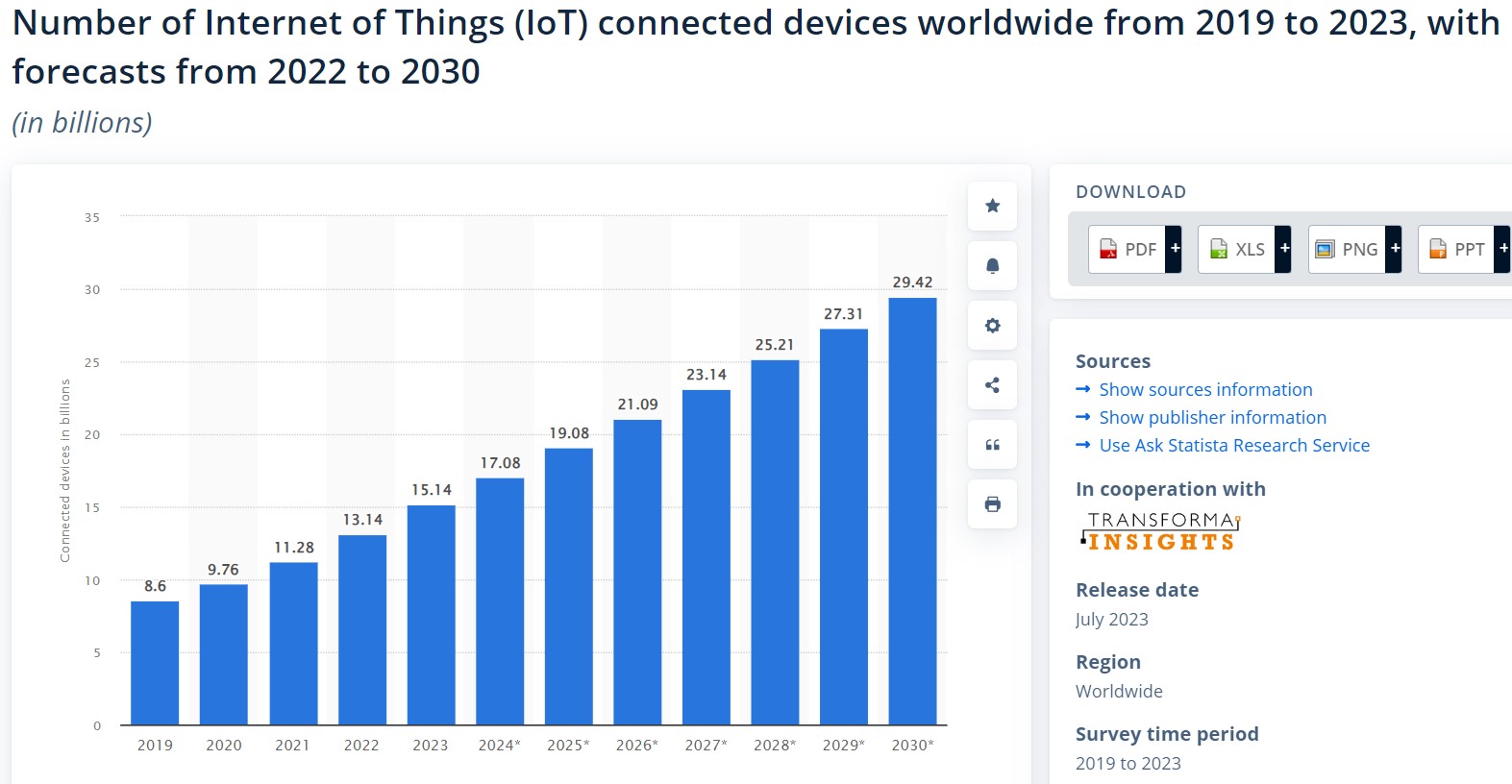
Image via Statista
With the rise of connected devices, it’s imperative that CRM vendors ensure that customer relationship management software can collect data from such devices. This is, in fact, a great opportunity for them to improve the data collection and accuracy of their CRM solutions.
This will allow businesses like yours to monitor and collect customer data at an unprecedented scale. You can use this data to provide more personalized customer experiences.
You May Also Like:
5. Rise of Social CRM
With people spending an average of approximately 2 hours and 30 minutes on social media each day, the rise of social CRM was inevitable. That’s why it is one of the top CRM trends on this list.
Social media helps sales and marketing teams better understand customer behavior and preferences by monitoring customer touchpoints on social media.
In fact, many consumers expect brands to promptly respond to customer queries or comments on social media platforms, making it a reliable customer service channel.
That’s why it’s important for CRM systems to integrate with various social media platforms to monitor such activity and allow businesses to provide prompt responses.
Check out this illustration that explains the evolution of social CRM from traditional CRM.
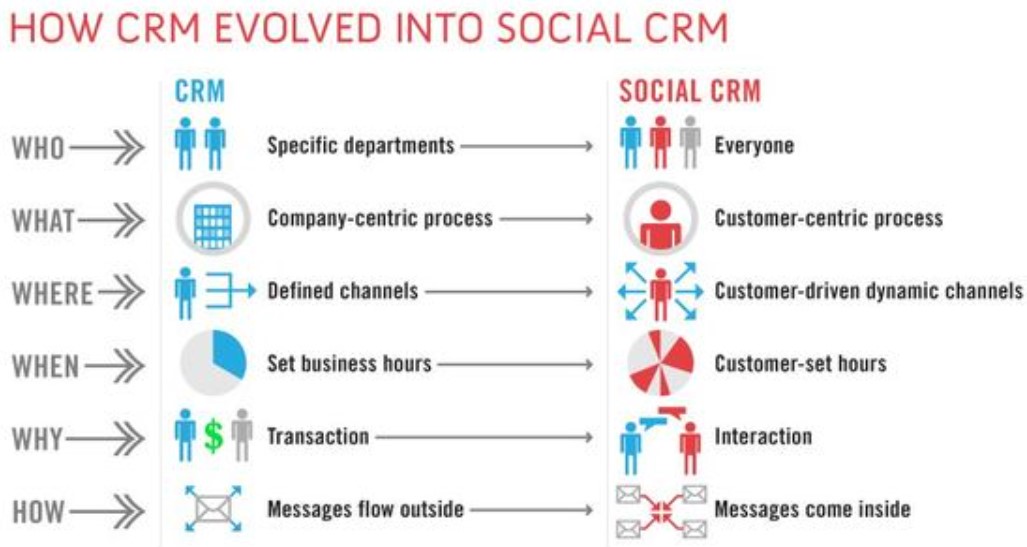
Image via Pinterest
6. Availability of More Advanced Automation Features
This is one of the smaller CRM trends, driven by the rise of AI, which is a much larger trend.
The growing adoption of AI in CRM has also led to more advanced automation capabilities in CRM software.
This trend is going to rise further, with vendors offering better and more sophisticated automated workflows for various customer-centric processes. And at the end of the day, this can streamline sales processes and support marketing efforts even better.
Most CRM systems now offer drag-and-drop automation workflow builders that you can use to automate various processes. Whether you want to automatically engage new leads or send trigger-based emails, CRM systems can help with that.
Here’s an example of a simple lead nurturing automated workflow you can create using Salesmate.
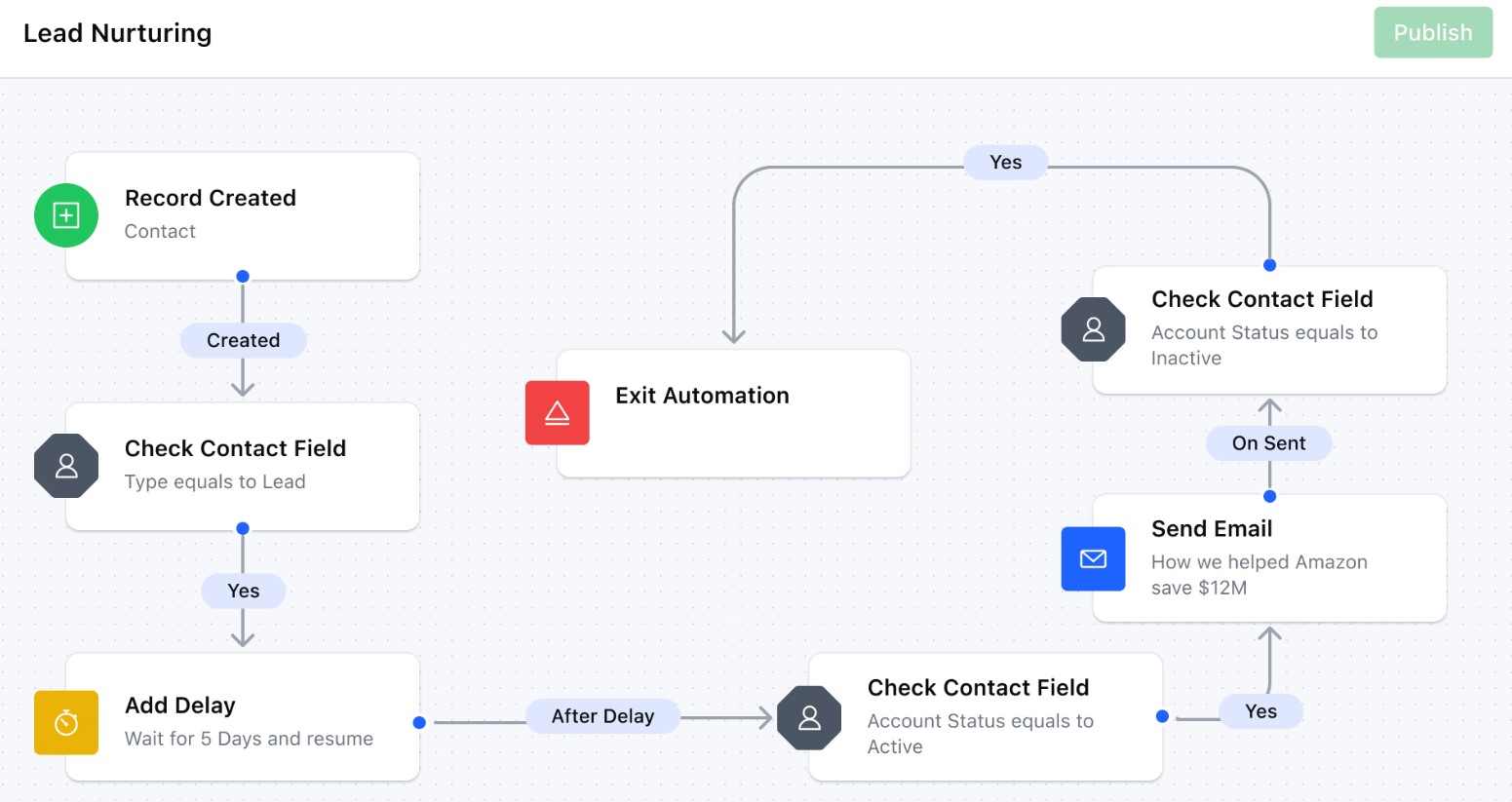
Image via Salesmate
This is just one example, but you can create a lot more advanced workflows using modern CRM systems that offer sophisticated automation features.
7. Growing Use of Mobile CRM
Increased focus on mobility is not just one of the CRM trends, but a larger sales and marketing trend. Marketers need tools they can use on the go to ensure they’re updated on important updates wherever they are.
CRM systems are also evolving in a way that extends beyond the office. With the rise of mobile CRM solutions, you can now track and manage customer interactions anytime and anywhere.
For instance, you can access customer data on mobile devices with mobile CRM solutions, making it easier to keep customer needs top-of-mind.
Apart from that, with the increasing adoption of remote team settings, it’s important to create a system where teammates can access data from anywhere.
This trend has led to the rise of mobile apps for CRM software, which are now offered by most CRM vendors. Here’s an example from Copper CRM. Read our detailed Copper CRM review to learn more about its features.
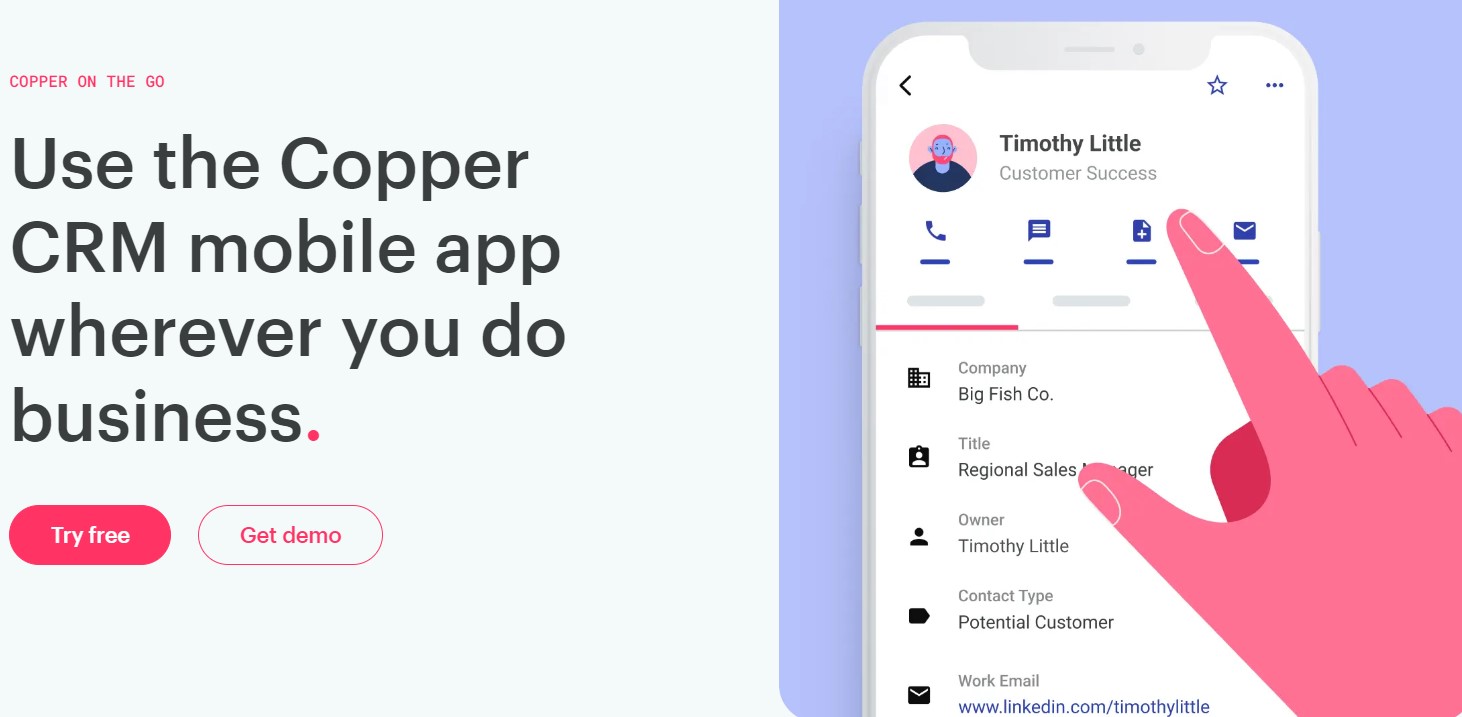
Image via Copper CRM
Pro Tip: When you evaluate a CRM, make sure you check its data security features. While mobile CRM is convenient, it should also be perfectly safe.
8. Increased Focus on Customer Experience
Gone are the days when CRM was used just for contact and customer data management. CRM strategies are shifting from just managing data to delivering exceptional experiences based on customer preferences and needs.
What is driving this trend?
This shift in business perspective is driven by the growing importance of customer experience (CX) as a key brand differentiator.
According to Forrester’s 2023 US Customer Experience Index rankings, four out of five business leaders agree that improving CX is a high-priority task.
Likewise, A 2023 survey by Salesforce further proves this as 80% of consumers agree that their experience with a company is as important as its product or service.
In fact, 47% are willing to pay extra for better customer service.
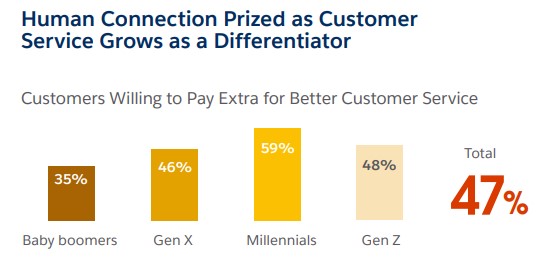
Image via Salesforce
What does this mean for the future of CRM?
Simply that CRM systems will offer more features for improving customer service and communications.
With better and more accurate data collection, CRMs will also enable you to provide personalized customer experiences.
Consider this:
Anytime an executive interacts with a customer, they’ll have access to the entire customer history with your brand. They can use this information to personalize their conversation and offer prompt solutions or answers to the customer.
Such personalized interactions lead to great customer experiences, which help build brand loyalty.
9. Rising Popularity of Self-Service CRM
According to the previously cited Salesforce survey, 72% of customers have used self-service portals for some purpose or another. 61% would prefer self-service for smaller issues.
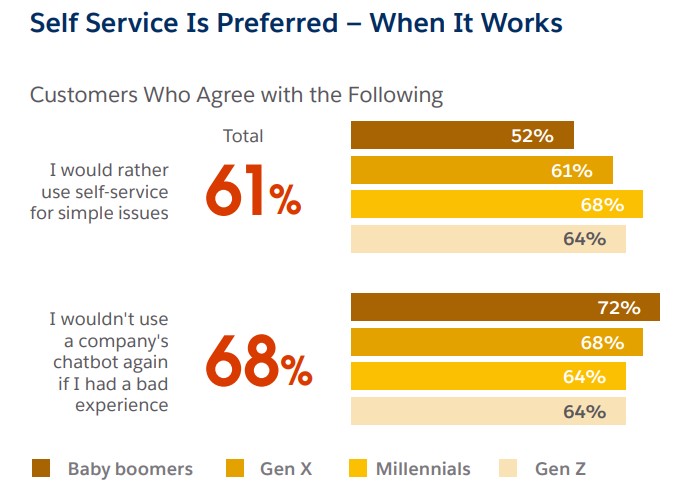
Image via Salesforce
The use of chatbots, however, is dependent on their ability to deliver good experiences.
This has led to one of the most popular CRM trends, where — for instance — customer service reps can better handle customer inquiries by providing access to more self – service options.
The key trend will be CRMs offering self-service portals for customers to access data, manage their accounts, and find quick solutions to common issues.
Chatbots will also play a vital role in perpetuating this CRM trend as customers can quickly find answers to FAQs without reaching out to customer support teams. Chatbots can also guide customers to the right product, service, or resource, depending on their needs.
How does it affect you?
If your CRM does not offer self-service options, you may need to upgrade to one that does. Or if your CRM provider offers another plan with these features, it may be time for you to upgrade.
Going forward, self-service CRMs will be the norm, not the exception, and making the switch early will give you an advantage.
You May Also Like:
10. Seamless Integration with a Variety of Tools
The number 10 pick for CRM trends to watch out for in 2025 is heightened integration.
CRM platforms work by collecting data from a variety of customer touchpoints. It then converts the information gathered into actionable and valuable insights on customer behavior that can be used for strategic decision-making. See the illustration below.
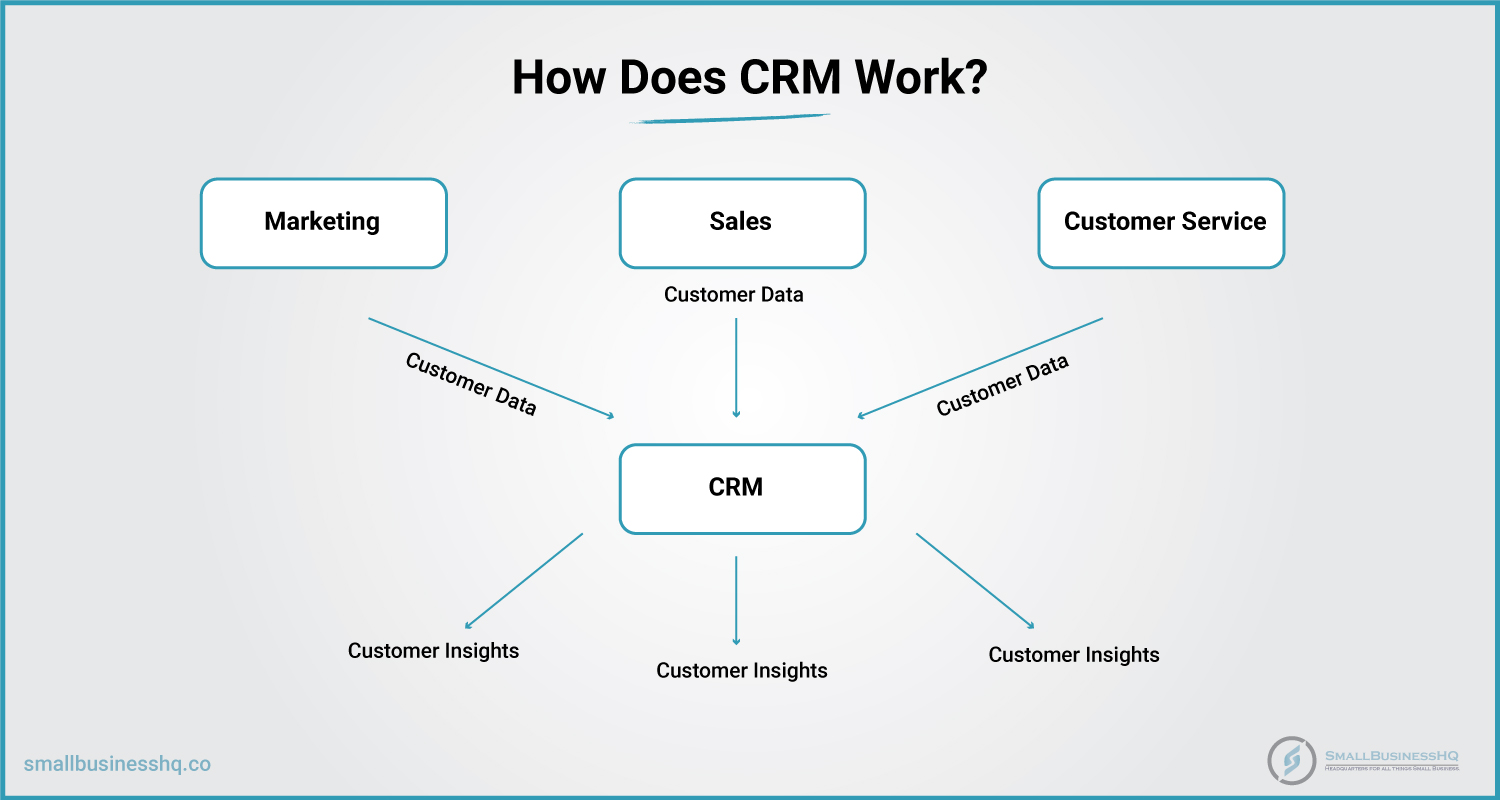
The better the CRM integration with your existing tech stack, the more exhaustive and accurate customer data it can collect.
You may be thinking that this is not new. Why is this a CRM trend?
Well, what’s changing is the type and ease of integration offered by CRM software. There are three key types of integrations:
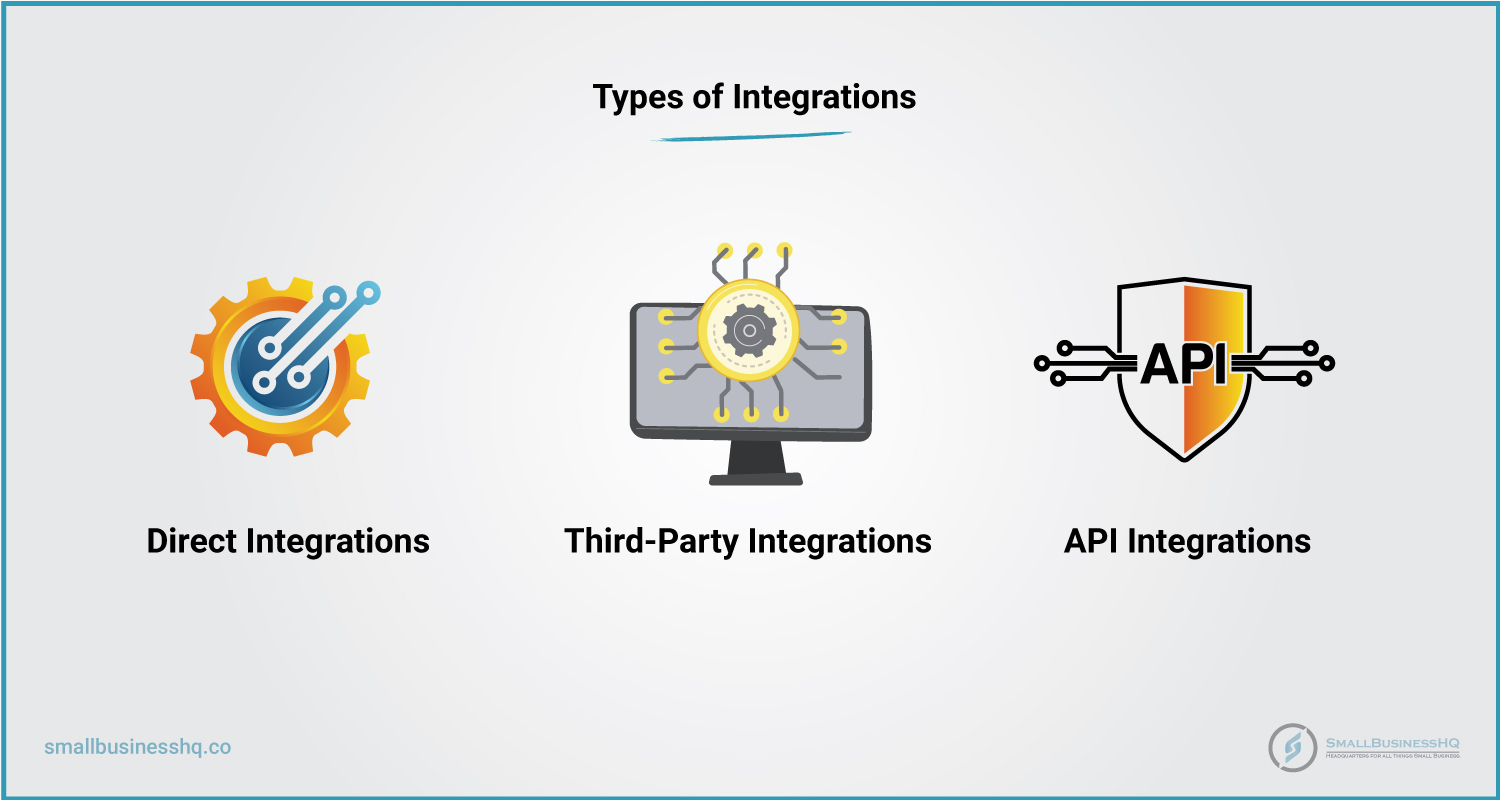
- Direct: These are native integrations offered by the CRM platform that can be implemented from the platform itself.
- Third-Party: These require third-party apps like Zapier to allow integration with various tools.
- API: This is for the more advanced CRM users who can use the CRM platform’s custom codes to make their own integrations.
Earlier, the number of native or direct integrations was limited and most CRMs relied on third-party or API integration options. Now, an increasing number of CRM vendors are aiming to provide better and more seamless direct integrations with all popular tools.
This will allow CRMs to seamlessly work with a company’s entire tech stack to collect, manage, and analyze customer data in real-time.
11. Availability of More Industry-Specific CRM
Another one of the recent CRM trends is the growing popularity and increase in the number of options for industry-specific CRMs.
Traditionally, CRMs were designed to cater to the needs of all types of businesses. The features were designed in such a way that they had multiple use cases.
Now, however, there’s a dynamic shift toward more niche, industry-specific features and solutions.
One driver of this trend is the sheer number of CRM software products available on the market. For instance, G2 has almost 700 CRMs listed in its database.
That said, one way for new CRM providers to differentiate themselves is to offer specialized CRM solutions that cater to unique customer needs and business outcomes across different industries.
Even established players like Salesforce have adopted this trend and are offering industry-focused CRM platforms.
Check out the various industries that Salesforce caters to.
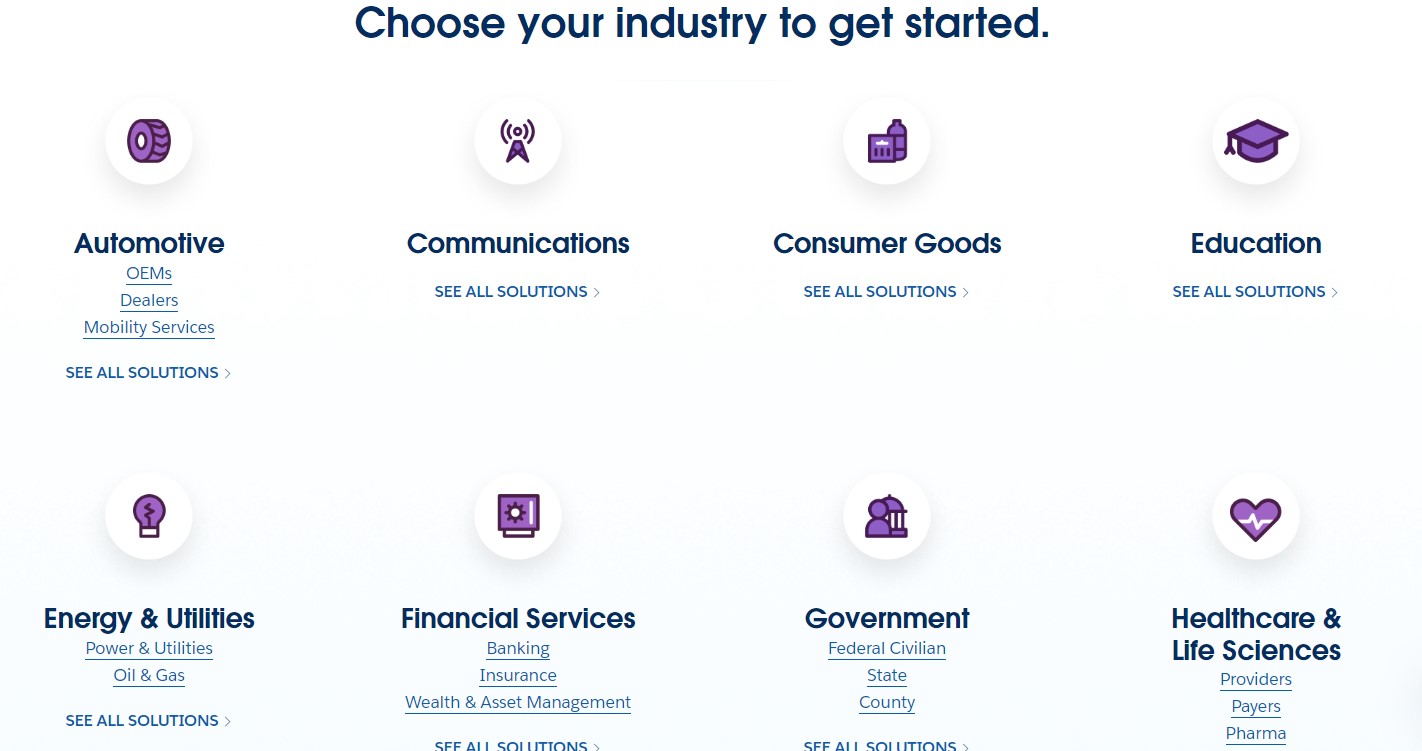
Image via Salesforce
This is one of the CRM trends to watch out for in 2025 and beyond. In the future, you may expect this to become the norm as more CRM vendors start offering specialized solutions for various industries.
12. Higher Reliance on Data and Advanced Analytics
It’s no secret that collecting and analyzing customer data has always been a core function of customer relationship management. However, one of the most interesting CRM trends we’re seeing in 2025 is a higher reliance of businesses on this data.
Businesses are using data collected by CRM platforms to offer better products and services, personalize marketing materials, improve customer relations, and more.
According to a 2022 report, businesses use data as a brand differentiator, among other strategic uses.
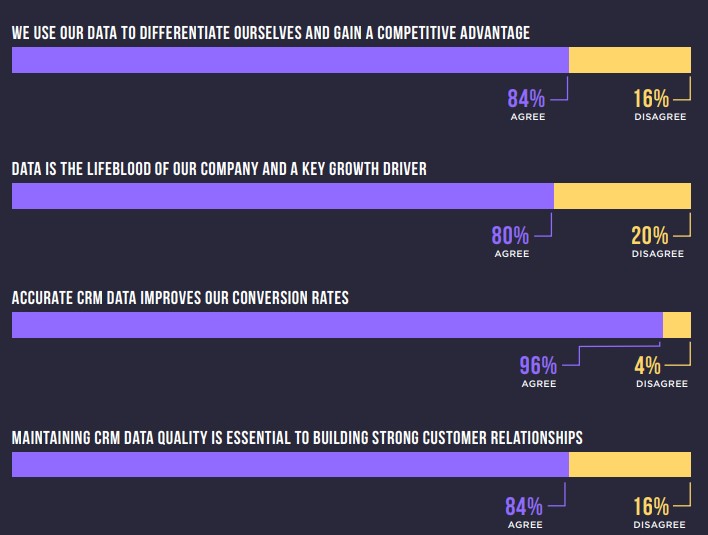
Image via Validity
This clearly indicates that data has become more important than ever before for businesses to improve their customer experiences and business performance.
How will this trend affect the CRM industry?
CRM vendors will compete to offer more advanced and comprehensive data analytics solutions. There will be more innovation in this area and you can expect AI to play an important role in the evolution of CRM data analytics solutions.
While many CRM systems claim to offer a 360-degree view of customers, with AI and other innovative technologies this may become a reality, quite literally.
Pro Tip: While it’s great for your business if you can collect customer data from a plethora of sources, you mustn’t cross the line to where it becomes unethical. Make sure you follow the regulations and seek user consent for all data your CRM collects.
13. Introduction of XaaS: Everything as a Service
Last on our list of top CRM trends is XaaS (everything as a service). It’s a fairly recent trend that is still in its infancy. In the future, though, it has the potential to become one of the most important CRM trends, so watch out for this one.
The idea behind XaaS is that any IT function can be transformed into a service for businesses. A vendor can create a platform to deliver that service and use a subscription model for businesses that want to use that service.
Some examples include platform as a service (PaaS) and infrastructure as a service (IaaS). However, it can be any service that can be delivered online and uses a recurring or subscription-based payment model.
The trend within the CRM industry is that organizations will use cloud-based solutions for various business processes. These solutions will be available as part of the CRM or as standalone products that can be integrated with a CRM software system.
6 Best Practices to Take Advantage of CRM Trends
To stay ahead of the curve and make the most of the latest CRM trends, consider implementing these best practices:
- Develop a clear CRM strategy that aligns with your company’s goals and objectives.
- Regularly review and optimize your CRM processes to identify areas for improvement.
- Regularly clean and update your customer data to maintain accuracy and reliability.
- Provide comprehensive training and support for your team to ensure they can leverage the full potential of your CRM system.
- Encourage cross-functional collaboration between sales, marketing, and customer service teams to provide a more unified customer experience.
- Continuously gather and act upon customer feedback.
You May Also Like:
FAQ
Q1. What are the biggest CRM trends for 2025?
A. Here are the top 13 CRM trends to watch out for in 2025:
- Increasing adoption of AI in CRM
- More focus on usability and ease of implementation
- Integration of voice and conversational UI with CRM
- Rising IoT integration with CRM
- Rise of social CRM
- Availability of more advanced automation features
- Growing use of mobile CRM
- Increased focus on customer experience
- Rising popularity of self-service CRM
- Seamless integration with a variety of tools
- Availability of more industry-specific CRM
- Higher reliance on data and advanced analytics
- Introduction of XaaS: everything as a service
Keep an eye out for these CRM trends, which will shape the industry in the coming years. Make sure you adopt the most influential trends early to gain a competitive advantage.
Q2. Which CRM is trending now?
A. There is no one CRM system that is trending or dominating the market. In terms of market share, established companies like Salesforce are still on the top.
However, keeping in line with the latest CRM trends on better usability and customer satisfaction, there are a plethora of options for you to try. In fact, businesses prefer easy-to-use and simpler solutions over advanced and complex ones.
Q3. Why should I keep up with CRM trends?
A. Following CRM trends helps you understand how the market is evolving and what new features are coming up to solve specific problems. By keeping up with the CRM trends you can proactively update or optimize your current CRM to get more done.
This gives you an edge over your competitors who might still be using legacy systems for basic contact management, while you’re leveraging AI and automation to delight your customers.
Q4. What is the future outlook for CRM?
A. Customer relationship management is an essential part of any business’s core activities and a good CRM system is essential for it. That’s why CRM will be a must-have for businesses in the future. It will no longer be just for large businesses but for everyone.
The CRM trends discussed in the post highlight the growing importance and adoption of CRM across businesses of all sizes.
That said, the future of CRM is bright, as more and more businesses will adopt CRM in the future.
Q5. How will AI impact CRM in the future?
A. Artificial intelligence is one of the most likely CRM trends to have the biggest impact on the CRM industry, especially because of its numerous applications and use cases. From allowing more advanced automation workflows to enabling human-like conversations via bots, AI will change everything.
That’s why this is one of the most important CRM trends of the last decade—one you absolutely can’t ignore.
Ready to Optimize Your CRM Strategy to Get Better Results?
There you have it—some of the biggest CRM trends to look out for in 2025 and beyond.
Now what?
Well, join the bandwagon early and adopt some or all of these trends, depending on your business needs. If there’s a new, innovative feature on the market, ask your CRM vendor if they also have plans to offer that.
If there’s a need, choose a CRM that can better meet your growing business needs and is updated with the latest technology and features.
Some of these CRM trends may also push you to update your CRM strategy and foster better customer relationships. Keep abreast of the latest CRM trends and be an early adopter to gain the most benefits from them. Good luck!





















